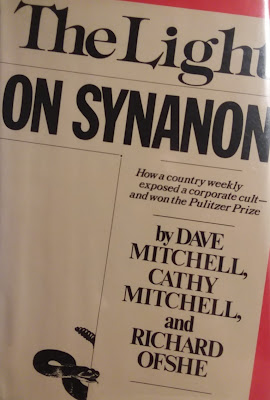She started her timer. In a very short amount of time, our task was to crank out a news brief using the limited information found in the press release.
“No weasel words!” she would say. “And don’t use the word ‘is.’ Avoid the use of passive voice at all costs.”
Did I mention we lost a letter grade for each AP Style mistake we made? No, well, that only added to the stress. Our armpits began sweating, to match our quickened pulses and dry mouths. We tried not to look up at the clock as we typed, read, deleted, and repeated the process all over again. You could hear classmates muttering curse words under our breath.
I survived the class. Did well in it. And one day the professor pulled me aside and told me she thought I had the makings of a great copy editor. “Go to the campus newspaper office,” she said. “They need a copy editor for this semester. You’ll have to take an editing test.”
She thought I, a lowly sophomore, had the chops to be the copy editor for the entire newspaper? I didn't know whether or not to be flattered or terrified. The editors I met with were kind, but I didn’t get the job. And I decided I liked the process of investigative reporting, interviewing, and writing much more than proofreading for typos and style errors. I went on to become an entertainment editor and then a news editor my senior year. I went back to that professor, who was also my advisor in the mass communication department, and took her class “19th Century Newspaper Women,” which I loved. And I learned she and her ex-husband had won a Pulitzer Prize for Meritorious Public Service in 1979 for their work uncovering abuses in drug rehabilitation center Synanon in California in the Point Reyes Light.
Dr. Catherine Mitchell was stern with me when she needed to be and kind when I struggled. I couldn't help but be intimidated by her--she had received her master's degree at Stanford University and I was a poor girl from the North Carolina mountains. She once asked me why my SAT scores weren’t higher. “I’m not good at math,” I told her simply. She encouraged me to apply for a scholarship for Hispanic journalists, but I told her I didn’t feel comfortable doing that because I wasn't bilingual.
This professor supported me when I needed to seek mental health counseling during the spring of my sophomore year. She was a trailblazer in the industry, and the mentor I tell people time and again when they ask how I became a writer. I don’t know where she is now, or if she is still living, but I hope wherever she is, Dr. Catherine Mitchell knows how much she always instilled in me the values of hard work, perseverance, and courage in journalism. She made history. Maybe one day I will, too.
Did you have any mentors who inspired you a a writer? I'd love to hear about them!
Renee Roberson is an award-winning writer and host/creator of the podcast Missing in the Carolinas.







2 comments:
What an awesome story! I may be the only writer around who didn't have a great writing teaching but then I was a little late figuring out what I wanted to do. My mentors were history teachers and math teachers. ::shrug::
I love this story! "No weasel words" is a memorable line. And being docked for passive voice is awesome. What a tough teacher! And a Pulitzer? She's amazing. I'm so glad she encouraged you, and I hope she reads this. :)
My high school art teacher gave me the gold metal in art for our high school, and I've never forgotten her support. She used to give me her tickets to fashion shows and art events in LA she couldn't attend. As far as writing, I had several teachers who encouraged me, and I will always remember my English teacher who read a poem of mine about how boring his class was in front of the class! He said it was a great example, and that encouraged me to be honest in my creative work, no matter what others think. :)
Post a Comment